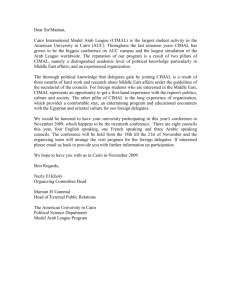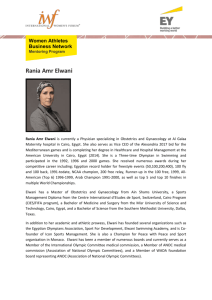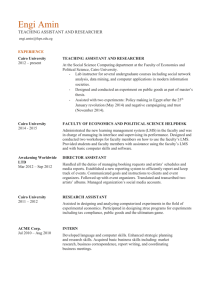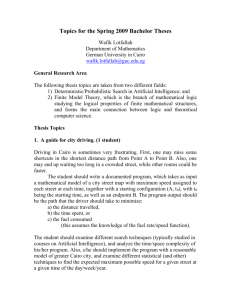cairoplus
advertisement
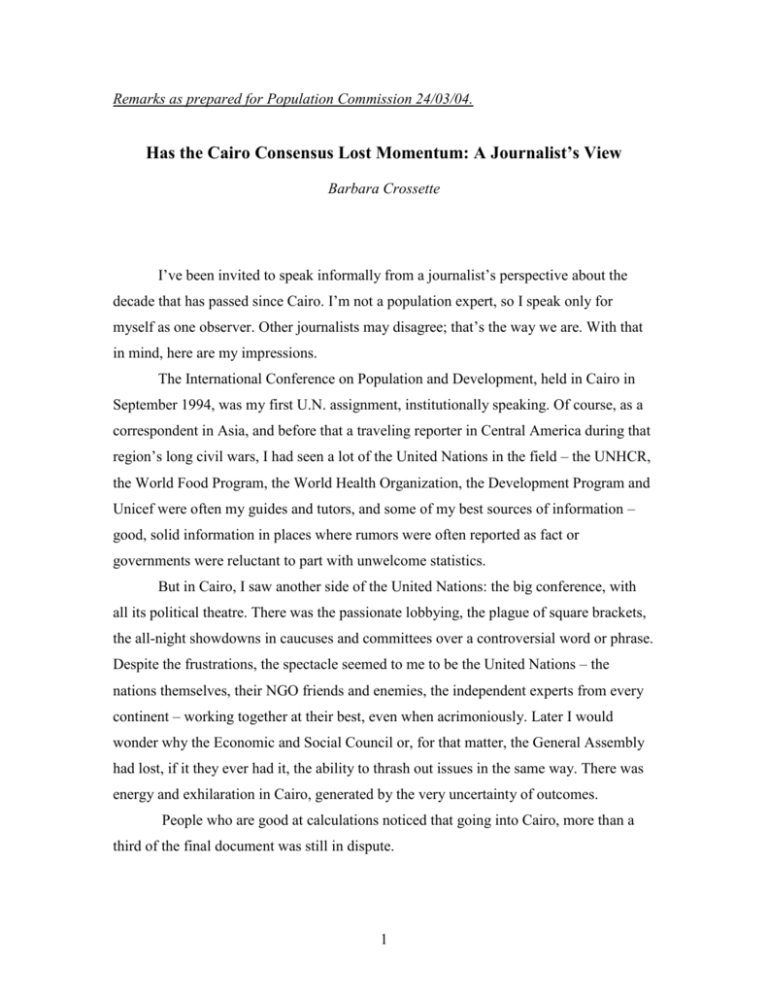
Remarks as prepared for Population Commission 24/03/04. Has the Cairo Consensus Lost Momentum: A Journalist’s View Barbara Crossette I’ve been invited to speak informally from a journalist’s perspective about the decade that has passed since Cairo. I’m not a population expert, so I speak only for myself as one observer. Other journalists may disagree; that’s the way we are. With that in mind, here are my impressions. The International Conference on Population and Development, held in Cairo in September 1994, was my first U.N. assignment, institutionally speaking. Of course, as a correspondent in Asia, and before that a traveling reporter in Central America during that region’s long civil wars, I had seen a lot of the United Nations in the field – the UNHCR, the World Food Program, the World Health Organization, the Development Program and Unicef were often my guides and tutors, and some of my best sources of information – good, solid information in places where rumors were often reported as fact or governments were reluctant to part with unwelcome statistics. But in Cairo, I saw another side of the United Nations: the big conference, with all its political theatre. There was the passionate lobbying, the plague of square brackets, the all-night showdowns in caucuses and committees over a controversial word or phrase. Despite the frustrations, the spectacle seemed to me to be the United Nations – the nations themselves, their NGO friends and enemies, the independent experts from every continent – working together at their best, even when acrimoniously. Later I would wonder why the Economic and Social Council or, for that matter, the General Assembly had lost, if it they ever had it, the ability to thrash out issues in the same way. There was energy and exhilaration in Cairo, generated by the very uncertainty of outcomes. People who are good at calculations noticed that going into Cairo, more than a third of the final document was still in dispute. 1 Yet out of Cairo came no less than a revolution. The conference – the people at the conference, a lot of them women – effectively put an end forever to the traditional assumption that to tackle population growth all that was needed was to set numerical targets – and then look for essentially mechanical ways to meet them. The Cairo conference, officially and informally, seemed to acknowledge that people – women and men, mother and fathers – and not governments were the best judges of how many children to bring into the world, and where and when. A broader theme that ran through the conference and into its aftermath was the realization that in talking about curtailing population growth and the complex relationships between population and development, or population and the protection of the environment, women had to be a central factor. We have all read the statistics. Here are a few from the World Bank: One more year of education for adult women in a developing country correlates with an increase in per capita GDP of about $700 a year. That one year in school will also reduce the child labor force by 1.4 percentage points and lead to a 4.3 percent increase in girls going on to secondary education. Contraceptive use increases by 4.5 percentage points. Percentages of the population with access to safe water and sanitation rise noticeably. Both men and women live one year longer. As a journalist, I went to Cairo with years of on-the-ground experience in Asia, periods of work in Central America and the Caribbean, and visits to a number of African countries. Population problems and prospects were a preoccupation almost everywhere, and the reality of people trying to cope with dwindling resources was evident for all to see. As a local family planner in India’s Rajasthan state told me, “People know there are not enough seats on the bus.” At the Cairo conference, all these disparate images came together. And not just for those of us reporting the event. Participants at the Cairo conference were also learning from each other and that bolstered their instincts that new ideas were needed, new ways of looking at pressures facing their world and the world around them. 2 Cairo set goals of its own in a program of action. Many advocates of that program would like to mesh its guidelines with those of the Millenium Development Goals, since they go so sensibly together in many ways. That could be a struggle. It sometimes appears that the United Nations spawns too many lists of aims and targets to be achieved. If targets are missed, the U.N., not its members, is declared a failure. In the United States, furthermore, the U.N. has been accused of holding too many conferences. But what a lot of American do not understand is how important action plans – even unreasonably optimistic ones – can be to people in other, smaller nations. I would argue that no set of priorities is as important to half the world’s population – its women -as the legacy of Cairo. Goals have a way of keeping momentum going. Now we are at the point we call Cairo-plus-10. But where are we really? And, given the increasing evidence that men as well as women are the beneficiaries of expanded female rights and opportunities, might this not be a good time to reframe, again, the population debate? A lot of stock-taking is now going on all around the world as the September anniversary approaches. A lot more assessment will be taking place from now until then, and well beyond. The same wide range of people and opinions heard in Cairo nearly ten years ago are beginning to be heard again now. Battle lines are again being drawn. For some, there will be a call to roll back the gains of Cairo – material and psychological. For others, there will be a concerted effort to keep that from happening. Some inside the United Nations system fear that a lobby led by an unlikely combination of conservative Middle Eastern nations, the United States and the Vatican – represented at the U.N. as the territory known as the Holy See – will mount a major drive to dilute or undo the language, meaning and impact of the policies adopted at Cairo, and reinforced at the Fourth World Conference on Women in Beijing the following year. This is a concern of Mervat Tallawy, the executive secretary of the Economic and Social Commission for Western Asia. A former Egyptian foreign ministry official, Mervat Tallawy was the behind-the-scenes organizer of the Cairo conference, for which, she said in an interview recently, Egypt was proud to serve as host. “The environment against the conference in Middle Eastern society was not very conducive at all,” she told 3 me. “But we in Egypt were one of the first who initiated the idea of family planning within the United Nations agenda – in 1969. We were not ashamed of hosting the conference. We were convinced that this is the way. I’m very proud of that achievement in Cairo.” Now, she says, after 10 years, “we are afraid that the conservative movement will take away what we succeeded to pass in Cairo.” Others are more optimistic. Thoraya Obaid, executive director of the Population Fund – and a Saudi who as a little girl only seven years old had to be sent away from home to a foreign country because she could not get an education in Saudi Arabia – told me a few weeks ago that people all over the world are rallying around as the 10th anniversary of Cairo approaches. “We had a national survey in almost 140 countries where we do lots of work,” she said, “and the surprising part is that this time, compared to 1994, we have almost 100 percent, 95 percent response from member states. This is one indication that the spirit has not been lost.” The Cairo conference, she says “changed the international debate about population from human numbers to human beings.” That was a seismic shift not easily reversed. New policies and laws are being put in place, in many places because of the influence of Cairo. I have just returned from Sri Lanka, where a women’s “bill of rights” is pending in Parliament. High on the list of the rights it would insure for women is “the right to control their bodies and rights relating to childbirth.” Protection against sexual harassment in the workplace and in public spaces is also specified, along with rights to land ownership and prohibitions against discrimination of all kinds. These are echoes of both Cairo and Beijing. There are many other examples. In the Internet age, women virtually anywhere will know about them because of the Web. Networking is now phenomenal among women widely separated by geography and culture. You don’t have to be rich to be connected. In Hanoi, Colombo or Valparaiso one dollar buys more than enough time. This new-found sharing of ideas and experiences is a trend that cannot be easily reversed. The concerns of women are not hypothetical. In southern Africa, where AIDS is now a women’s disease, a task force appointed by the Secretary General and led by Carol 4 Bellamy, executive director of Unicef, produced some tragic findings that illuminate why women increasingly talk of codifying rights. Thirty-four percent of girls between the ages of 15 and 19 said that their first sexual experience was the result of trickery, rape or persuasion against their judgment. Often this has economic roots. A man who will pay your school fees may be difficult to refuse. In Zambia, one in eight teenaged girls said they had been forced into sex by a man in the previous 12 months. In several countries, women said overwhelmingly that decisions about their health care were not made by them. In several countries, significant numbers of women thought that their husbands had the right to beat them for reasons ranging from burning the dinner to refusing sex. Women now are not afraid to insist that if too many people – call it overpopulation or an unsustainable density in any given place – are the cause of low health standards, poor education levels and the scarcity of natural resources, women have to be key to solutions. If they can educate themselves, send their daughters and sons to school, have healthier families and more choices about how many children, if any, they feel the family can handle, women are proving that they can “talk fertility down.” That’s a phrase coined by Joe Chamie, whom all of you here know well. This has happened in many cultures and in religious environments as different as those of Ireland, Iran and India. Women talk to other women. The word spreads. Government policies may not the most important factor. But with or without good social policies, women still need direct help. Thoraya Obaid knows better than most what still needs to be done. In a speech to the European Population Forum in January – one of a number of regional meetings called to reassess developments since Cairo and look to the future – she said that demand for family planning supplies will increase by 40 percent by 2015, yet she cannot meet even the demands for such services today. There is a shortfall, she said, of over $100 million needed to send condoms and other contraceptive supplies to the developing world. The pledges made at Cairo are falling $3 billion short. Yet every day, 14,000 people become infected with HIV-AIDS and 1,450 women die of complications of pregnancy and childbirth. The World Health Organization puts those paternal deaths higher – at 1,600 a day – and says that 99 percent occur in developing countries, and most could be prevented. 5 As for the world environment, which was part of the Cairo agenda, Nafis Sadik, who presided over that conference and is now the Secretary General’s envoy for HIVAIDS in Asia, said this in 1994: “ If we had paid more attention to empowering women 30 years ago, we might not have to battle so hard for sustainable development today.” It should be clear by now that calls for involving women in development are no longer expressions of opinion. Promoting the rights of women – or, if you wish, giving more attention to women – is not a matter of ideology, of radical feminism, of Western bad examples or any other theoretical cause. The women of Africa, Latin America and Asia are disproving such facile explanations every day. Facts are facts. The statistics are there in plain view and piling up, collected by the World Bank, the United Nations Development Program – which published the report on the Arab world that listed the repression of women as one of the three great deficits of Arab societies – by Unicef, Unifem and so many other agencies and programs, along with scores of governments and hundreds of NGOs. Both extremes in the debate on the role of women in crucial areas of development and the health and wealth of nations might do well to end their arid debates. On one side are those who would look for moral or theological reasons to deny women an equal as possible place in society. On the other side are some women’s groups that can be equally absolutist and uncompromising in pressing for what look like wholesale remaking of traditional cultures in the same of gender equality. Were they to debate their positions in the poorest villages on earth, they would certainly be regarded as about as relevant to daily life as creatures from outer space. There are new ways to frame the discussion of the Cairo legacy. Practicality is one standard that can be applied with minimal emotional heat. If the statistically based conclusions of the World Bank and UNDP on the major impact of improvements in the lives are women are taken as a guide, programs can much more effectively meet needs within the contexts of varying social traditions and beliefs. What can be said about sex in anything-goes Thailand, for example, is very different than what may acceptable in rural India, where discussion may require a great deal more circumspection. 6 Sometimes, however, the inherent good sense of people everywhere surprises experts. Given good information, minds can change; culture can change. There are, for example, African governments and clan societies from Egypt to Uganda to Senegal that have taken on the once-taboo subject of female genital mutilation – female circumcision – and transformed it from a tradition to an unacceptable practice within a matter of a few years. With the change has come the realization that Africans themselves were ready to spare their daughters from this severely damaging rite, especially when given the option of substituting a harmless but important alternative ritual. With Africans – women and men -- in the lead, people of the global north have been less hasty to declare that campaigns against the practice are somehow assaults on native beliefs. This may not be a direct outcome of Cairo, but it has happened in the post-Cairo years. Indeed, in Cairo, Egyptians NGOs invited delegates to visit clinics dealing with the results of this practice. The same can be said for the trafficking of women and girls for prostitution. While the problem is still huge and growing, the abuses of the trade have since Cairo become a subject of increasing concern and more action from the mighty United States government to the smallest of Asian NGOs The next step is to begin to address the issues of women’s status in the context of national and international security. Believe it or not, this is already happening, and the trend could do a lot to defuse the emotive components of debate over the legacy of Cairo. What were once considered “soft” issues, and nothing, it was thought ,could be softer than women, are moving into the near-vision of intelligence agencies in an age of new epidemic diseases, the growth of international crime and the dawning of an era of transborder terrorism offering no clear targets for retaliation. NGOs are beginning to address this new world in new ways. In December, Population Action International in Washington, released a report arguing that demographics held enough clues to civil conflict to serve as the basis for policies of prediction and prevention. The report, called The Security Demographic: Population and Civil Conflict After the Cold War, ranged over 25 years of research in 180 countries. It concluded that countries that have gone through the demographic transition from short lives and large families to smaller families and longer lives are less vulnerable to civil war. Nations with high numbers of young adults – and more on the way --- and crowded 7 cities and depleted natural resources – notably farmland and water -- are more likely to face conflict. In many troubled countries, the report also said, girls lag behind boys in educational attainment, women have fewer chances to work outside their homes, and reproductive health services and information are less readily available. The links were clear. When the report was released, Robert Engelman, one of its co-authors said in a statement that “There are many benefits to societies in shifting toward lower rates of birth and death, but the idea that the demographic transition could actually reduce the risk of violent civil conflict is new to the security community.” A demographic transition owes much to the ability of women to control the size of their own families though access to safe contraception and competent help throughout their reproductive lives. That should be obvious. Women have the babies. In the world at large, the poorest women in the poorest countries, where female status is low and health care minimal, will be producing almost all of this century’s population growth. From what I have seen and heard from women like these, they do not want to play this role by default. Like women anywhere, they want choices. When given those choices – to choose, for example, a reliable contraceptive over sterilization in a filthy clinic, or a breathing space to rebuild an anemic body rather than deliver another unplanned child – women bring fertility down, without rhetoric or fanfare. Pressures on food supplies are reduced, demands for education rise. Countries do not produce millions of young people who live without hope and often die in conflicts that are the only work they can find. When AIDS ravages whole countries, instability and poverty also increase. Orphans number in the millions, creating another tragic source of hungry, disaffected youthful recruits. But preventing the wildfire spread of the virus means changing behavior, and that includes giving women the right to say no and the right protection for saying yes. There are no ways around such facts. In this anniversary year, the time seems right to shift the emphasis of Cairo’s legacy away from what threats traditional social structures could face if women’s lives are improved to the threats that the world at large may confront if they are not. 8 The Cairo consensus certainly has cracks. Its shell was always fragile. But its health cannot be judged by the deadlocks over words like gender. Such demands remind me of the famous American who said that it depends what the meaning of is is. Under the surface, however, the meaning and momentum of Cairo run strong, reaching down to the grass roots, where the spirit of consensus resonates even among those many, many people who wouldn’t know what or where Cairo is. Barbara Crossette, columnist for U.N. Wire, an independent online report, was The New York Times United Nations bureau chief from 1994 to 2001. end 9

